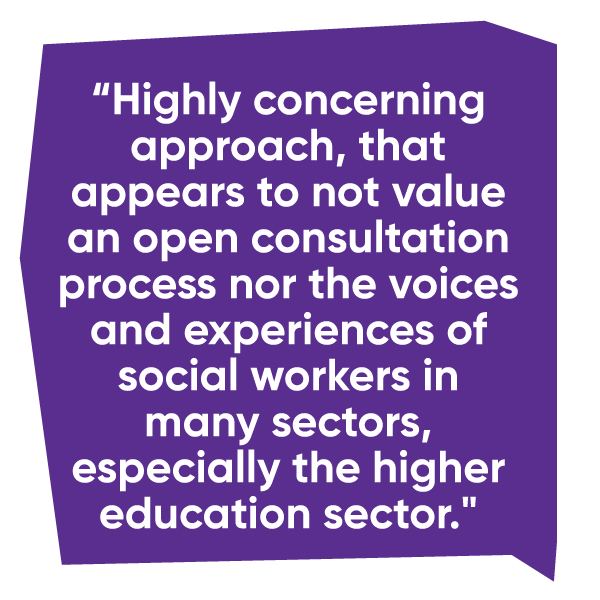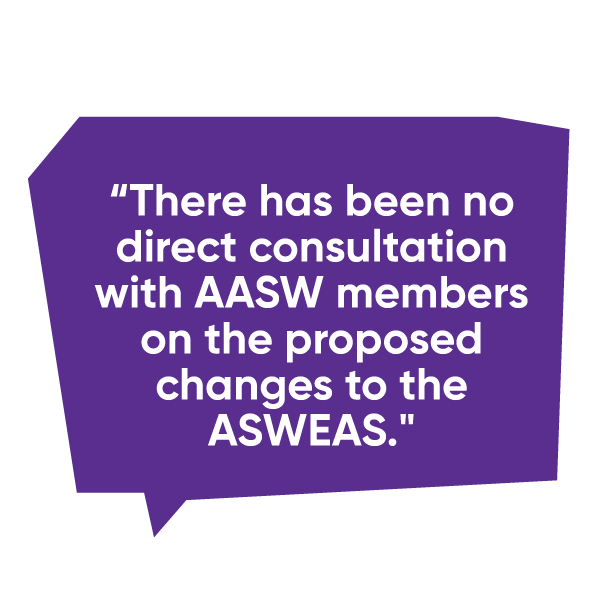NTEU calls for Australian Association of Social Work (AASW) to immediately withdraw Australian Social Work Education and Accreditation Standards (ASWEAS) and engage in proper consultation with universities and those in the sector concerned with quality social work education. We call on AASW to honour their responsibility and previous commitment to protect educational standards and industrial conditions that enable quality education for social work students.
Universities claim to be operating in a financially constrained context, always seeking ways to cut costs which often impacts resourcing and staffing. The newly released ASWEAS (2024) plays into this agenda, removing previous protections for staffing levels and resourcing for quality education. The 2024 ASWEAS claims to be outcomes-based but retains some arbitrary inputs such as 1,000 hours of field education (ignoring research evidence that 800 hours of field education are just as effective). It also removes inputs protecting resourcing and minimum staffing. Social work programs across Australia are now at risk, right at the time when there is a strong workforce demand for more social workers.
Sadly, the new standards reflect a breakdown in the relationship between the AASW and universities. One of the changes in the new ASWEAS (2024) is the removal of: “by mutual agreement with HEPs [Higher Education Providers], since the 1960s the AASW has been charged with the professional accreditation of social work programs” (AASW ASWEAS p.6 2023).
This is replaced by: “AASW seeks to ensure that Higher Education Providers…equip the next generation of social workers” (AASW ASWEAS 2024, p.4), indicating a significant change in the nature of the relationship between the AASW and Australian Council of Heads of Social Work Education (ACHSWE) and by extension, Higher Education Providers (HEPS).
We understand the CEO of the AASW approached the non-social work managers in universities and HEPs directly, attempting to drive a wedge between social work heads and their managers.
In previous ASWEAS reviews the professional body the Australian Association of Social Workers (AASW) has undertaken comprehensive consultation and committed to a partnership with social work programs as part of this. Despite claiming to have engaged in wide consultation, and going against its previous practice, the final draft was not circulated for feedback before it was approved by the Board.
Lack of Consultation
Recently, the NTEU conducted a national survey to both share information about the standards and gather social work educators’ perspectives about the changes. Of the 167 respondents, over 80% were concerned that the changes to the proposed ASWEAS would undermine the quality of social work education and the employment conditions of social work educators.
NTEU survey respondents offered unsolicited comments indicating high levels of concern about the lack of transparency in the consultation process. For instance:


Erosion of quality social work education
The previous ASWEAS (2023) included clauses which protected staffing and resourcing to ensure the quality and integrity of social work education aimed at producing high quality graduates. These have been erased in the 2024 version.
For example, the following clauses have been removed:
“Being taught by a clear majority of academics qualified and experienced in social work theory and practice” (AASW 2023, p. 19).“The HEP [Higher Education Provider] will appoint a Field Education Unit Academic Lead … must be appointed at Level B or above, a qualified social worker with at least five years post-qualifying experience and eligible for membership of the AASW (p.12).
“The Head of the Social Work”… is expected to be a professor that is “eligible for membership of the AASW” (p. 20).
Minimum staffing requirements, including 5 x Full Time Employees (FTE) social work qualified academic staff members at Level B or above or 8 FTE for programs delivered across multiple campuses. Importantly, “evidence should be provided to show staff increases commensurate with growth of the student cohort.” (ASWEAS, 2019, 2023, p. 20)
2024 ASWEAS instead replaces these with vague/unenforceable statements and does not mention the number of teaching staff needed or specify levels of appointment. For instance, the Head of Social Work doesn’t need to be a professor or even a senior academic, it’s very important that the next generation of social workers are taught by research active leaders in social work including professorial staff. The vague statements about staffing remove previous industrial protections and threaten the provision of quality social work education.
Similarly, the 2024 ASWEAS no longer specifies minimum of 16:1 student:teacher ratios for skills teaching, despite their strong defense of the need for this in their previous standards (ASWEAS 2023, p. 19). Without these minimum standards, there could be 300-500 students in a single class trying to learn about specific practice areas and professional communication skills.
Staffing requirements for field education are equally vague, having removed academic classification for the field education coordinator and provide far less protections for essential resourcing and staffing of field education units.
Practice Education
Curiously, in a document that claims to be outcomes-focused, and acknowledges the need for new technologies in professional practice, the AASW has ignored the more generous provisions introduced during COVID-19 pandemic, which proved to be equally effective in producing high quality high quality social work practitioners. For instance, 800 hours of supervised placement has reverted to 1,000 hours. This at a time of severe shortages of placement opportunities and qualified supervisors.
Instead of permitting the 20 days of face-to-face classroom-based learning in small groups to be completed online, as it was during COVID-19, the new standards insist on in person attendance. This is very costly for students who have to pay for travel and accommodation to attend. Particularly disadvantaged are those students in regional, rural and remote areas, those with accessibility requirements and those with caring responsibilities.
